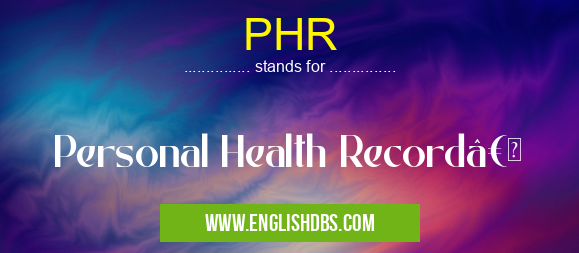What does PHR mean in HEALTHCARE
Personal Health Record (PHR) is an online collection of health information about a person. It includes data from both health care providers and individuals that can be accessed securely over the internet, allowing for easy access to personal medical history. PHR’s are designed to provide individuals with access to their medical records and allow them to manage their own health care decisions more effectively.

PHR meaning in Healthcare in Medical
PHR mostly used in an acronym Healthcare in Category Medical that means Personal Health Recordâ€
Shorthand: PHR,
Full Form: Personal Health Recordâ€
For more information of "Personal Health Recordâ€", see the section below.
» Medical » Healthcare
Definition
A PHR generally consists of data related to a person's medical history, current medications, allergies, immunization records, lab results, vital signs, and other relevant health data. It allows for easy sharing of patient information between doctors, nurses, and other healthcare professionals involved in the management of the patient's care. Furthermore, it facilitates communication between healthcare providers by providing them with access to timely updates on their patient's condition.
Benefits of Using a PHR
By using a PHR in healthcare settings, patients can better understand their own condition and make more informed decisions about their treatment options. Furthermore, they can quickly review previous visits as well as obtain information on any new medications prescribed or treatments recommended since the last visit. As a result of having easy access to up-to-date medical information through the use of a PHR system, inappropriate drugs or treatments may also be prevented from being prescribed due to drug interactions or adverse reactions caused by other treatments or medications already currently in use. In addition to helping ensure better safety when taking medications or undergoing surgery procedures, many studies have found that utilization of PHRs helps improve clinical outcomes and overall quality metrics within healthcare systems.
Essential Questions and Answers on Personal Health Record†in "MEDICAL»HEALTHCARE"
What is a Personal Health Record (PHR)?
A Personal Health Record (PHR) is an electronic record of a person's personal health information, which includes medical history, medications, allergies, immunization dates, lab results and other important health facts. A PHR provides patients with secure access to their medical information at any time, allowing them to view or modify it as needed. By having this convenient online access to their medical information, individuals can become more active in managing their own health care and making informed decisions about it.
Who can use a Personal Health Record?
Anyone who has used health care services or plans to in the future can benefit from using a PHR. It is ideal for individuals with chronic conditions and those who need to keep track of multiple medications as well as allergies and health histories for themselves or family members.
How secure is my PHI when stored in a PHR?
Security is paramount when storing PHI in a PHR. The system should have passwords that meet stringent criteria as well as multiple layers of authentication including biometrics if desired. Additionally, all data should be encrypted and regularly backed up on secure servers located offsite from the user’s computer(s).
Who manages the Personal Health Records?
A patient typically manages his/her own Personal Health Record by authorizing providers such as doctors or hospitals to upload records into it. Access rights may also be granted for family members or guardians if needed. In most cases, the individual maintains control over what pieces of information they are sharing with healthcare providers and who else has access to their record.
What type of information should I include in my Personal Health Record?
Your Personal Health Record should include any pertinent medical information about yourself or family members including but not limited to medications taken regularly, immunization dates, test results (i.e., lab work and blood work), medical history and condition notes from your doctor along with contact details for any specialists you might visit regularly (i.e., allergists).
Can I add documents other than electronic records to my PHR?
Yes! Documents other than electronic records such as paper copies of X-rays or MRI scans as well as paper prescriptions can easily be scanned into your PHR for easy access later when needed either by you or your healthcare provider(s).
Are there privacy concerns associated with keeping a PHR?
As with all types of electronically stored health related data, some privacy concerns exist when creating and maintaining a PHR; however if security protocols are properly followed then these risks are greatly minimized providing users peace of mind that their data remains safe from unwarranted access by third parties.
Where do I find a reliable source for hosting my personal health record?
There are several reputable cloud-based platforms available that offer secure storage solutions for personal health records including but not limited to EHR4U cloud platform developed by Microsoft; iHealth Vault platform designed specifically for mobile devices; Accellion suite also offering enhanced mobility capabilities amongst its features; ShareScape Secure Exchange Suite developed specifically for healthcare providers; and Epic Hyperspace Cloud Services hosting services tailored towards large scale enterprises.
Final Words:
Personal Health Records are powerful tools that enable patients and caregivers easier access to important medical information while making sure privacy is protected at all times via encrypted technology. By using digitalized data sharing techniques such as these, healthcare professionals can interact with each other more easily as well as gain quick access to crucial medical evidence concerning individual patients without having to request physical documentation multiple times across different providers or multiple locations for even quicker evaluation processes which ultimately leads directly into improved outcomes for all those people involved within this process in combination with insurance companies saving money instead of having teams spend days requesting data from all sorts of external systems.
PHR also stands for: |
|
| All stands for PHR |
